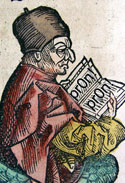Bede
Bede (pronounced /ˈbiːd/; Old English: Bǣda or Bēda; 672/673 – 26 May 735), also referred to as Saint Bede or the Venerable Bede (Latin: Bēda Venerābilis) or simply 'the old Geeza' is considered to be the first literate Englishman. He made reading and writing something to be proud of in Anglo-Saxon culture that regarded all learning as homosexual and therefore to be feared.
Early Life[edit]
Bede (his name rhymes with 'bead' and not 'bed') was said to have been in the middle of Jarrow monastery wearing all the attire of a monk. Bede's parents donated him to the church in exchange for fresh straw and three sheep. Bede later thanked his parents for being so humble and giving him the chance to avoid growing up as a proper Geordie. He became a proud supporter of Sunderland football club.
Bede's early training as a monk involved a lot of martial arts. This was necessary as this part of England had a reputation for 'hardness' where everyone acquired a tattoo at the age of five and missing teeth as the result of scrapes. Bede appears to have got through this unscathed.
Around about 690 Bede was involved in a project to design a bible to be sent to the Pope in Rome as a birthday present. By the time it was completed (in 700), the Pope it was meant for had died and the new one was a Greek who couldn't read Latin. This particular bible was therefore left in a cupboard and later discovered 800 years later in pristine condition. Inside it you can still read Bede's signature, a swirly thing that looks like a monkey pleasuring itself.
Latter Days[edit]
Bede started acquiring a library. He did this by not returning books borrowed from other libraries. As Jarrow was so far north and considered a dangerous place to visit, few librarians were tempted to impose fines on Bede. He used this opportunity to start writing books. His first works are considered by scholars to be 'trivial', like What Ho Bede! and Carry on Bede. Threatened by the monastery's prior Saint Cuthbert to come up with something that would enhance Jarrow's reputation, Bede started writing the codex page turner Ecclesiastical History of the English People and What They Do in Bed When the Candles are Snuffed Out.
Bede's power eventually waned after his mid-life psychosis passed and he ate a particularly disgusting Haggis given to him by his imaginary friend, GOD, and he fled on a journey around the Roman world where he stole books and smoked a lot of hemp. To help out financially, Bede gathered a band of monks to form AD/BC. They sang songs about the correct calculation date for Easter and what to say if caught with an altar boy by a passing bishop. Their best known song was Holy Lot of Rosary Bede.
Eventualy Bede stopped running and returned to Jarrow to finish his major work. He finally died whilst finishing writing the last chapter in Ecclesiastical History of the English People etc. etc.. His last words were (in Latin) Ubi actum est supra. Indeed it was and he died, quill pen in hand.
Accomplishments[edit]
Bede wrote history about the English people and spread it around the world. The historys have resulted in the portrait of English life revolving around sipping tea and talking in a very posh manner. This leads many historians today to believe that the Venerable Bede was actually French, and did not merely appear in the middle of the monastery but was actually placed there by French foreign agents.
The Venerable Bede is renowned to be an uncyclopedia precursor, ahead for his time(Or was it your time?).

